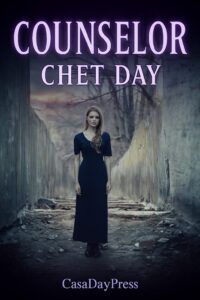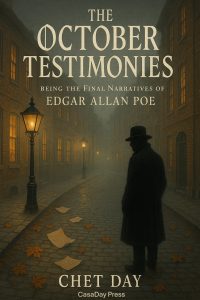Time to Get Personal
In my first two posts, I talked about the foundations of horror fiction and what the masters have taught us about the craft. Now it’s time to get personal–and to be completely honest about something I’m attempting that might be foolish, fascinating, or both: AI horror writing.
At 77, after getting an unexpected second chance thanks to Grady Hendrix featuring Halo in Paperbacks from Hell, I’m doing something I never expected: collaborating with artificial intelligence to create horror fiction.
Not because AI can write great horror (it can’t, not yet), but because I’m curious about what happens when a veteran horror writer tries to bridge the pulp paperback era with this new frontier.
Let me tell you what I’ve learned so far. It’s humbling.
The Collision, Not the Integration
Here’s the first truth: this isn’t a smooth integration. It’s a collision. A messy, frustrating, occasionally exhilarating crash between two very different ways of creating stories.
When I sit down to write horror the traditional way–the way I wrote Halo, The Hacker, and Counselor–I’m drawing on forty years of reading the genre, twenty-four years of teaching high school (which taught me more about human psychology than any textbook could), and lived experience that includes triumph, loss, grief, and recovery.
I know what a sociopathic teenager sounds like because I taught them, and I understand institutional failure because I watched it happen. I can write about grief with authority because I spent five years after Ellen died crafting a memoir about our forty-seven years together.
AI has none of that. It has patterns and it has vast training data. It has the ability to generate technically correct prose at impressive speed. But it doesn’t know anything. It hasn’t taught a single class, loved a single person, or felt a single genuine fear.
And you can tell.
What AI Horror Writing Can’t Do (Yet)
Let me be specific about what happens when you try to get AI to write horror fiction:
The prose is often flat. Even with detailed prompts about tone and atmosphere, AI-generated horror tends toward the generic. It knows the words for fear but can’t make you feel the fear. The difference between “The character was terrified” and prose that actually terrifies the reader–that gap is enormous.
The pacing is wrong. Remember what I said in Post 2 about how Stephen King and Ramsey Campbell build tension? AI doesn’t understand that patience. It either rushes to the scare or meanders without purpose. That slow-burn dread that makes horror work requires a human sense of timing.
Characters feel like types, not people. AI can generate a “troubled teenager” or a “grieving widow,” but these characters rarely surprise you. They don’t have the psychological complexity that comes from observing real humans over decades. They behave as horror characters are “supposed” to behave, not as real people actually would.
The scares are predictable. AI has read millions of horror stories, so it knows all the tropes. But knowing the tropes isn’t the same as knowing when to use them, when to subvert them, or when to create something new. You get competent but forgettable horror.
Institutional knowledge is missing. In Halo, Billy’s evil is enabled by Christopher School’s institutional dynamics–how schools actually protect their stars, how teachers actually miss warning signs, how administrators actually prioritize reputation over truth. AI can’t replicate this because it’s never been inside those institutions.
The technical competence is there. The soul is not.
So Why Am I Doing This?
Fair question. If AI can’t write good horror, why collaborate with it?
Because I’m not asking it to write the horror for me. I’m trying to figure out what role it can play in the creative process, even with all its limitations.
Think of it this way: I’m not trying to create a self-driving car. I’m trying to figure out if AI can be a useful tool in the garage while a human does the actual driving.
Here’s what I’ve found AI can actually help with:
Brainstorming and iteration. Need twenty variations on a plot twist? AI can generate them instantly. Most will be terrible, but sometimes one sparks an idea I wouldn’t have found on my own.
Research assistance. Want to know about 19th-century psychiatric practices for a Gothic story? AI can pull together information faster than I can google. I still have to verify it, but it’s a useful starting point.
Structural feedback. AI can analyze a chapter and point out pacing issues or logical inconsistencies. It’s not always right, but it’s another set of “eyes” on the work.
Dialogue polish. Sometimes I write dialogue that’s almost right but not quite. AI can offer variations that help me find the precise phrasing I’m looking for.
The grunt work. Formatting, consistency checking, catching typos–AI handles the tedious stuff so I can focus on the creative work.
But here’s the crucial part: I’m making every creative decision. The voice is mine. The characters come from my understanding of human psychology. The institutional dynamics come from my teaching experience. The emotional truth comes from my life.
AI is the assistant, not the author.
The October Testimonies Experiment
My first real test of this collaboration was The October Testimonies–six interconnected Gothic tales exploring Edgar Allan Poe’s mysterious death. I chose this project specifically because:
- It required writing in authentic 19th-century style (a technical challenge AI could potentially help with)
- It was based on historical mysteries (requiring research AI could assist with)
- It was short enough to iterate on extensively (allowing me to refine the collaboration process)
The result? Something I’m genuinely proud of, but not because AI wrote it. I’m proud because I learned how to use AI as a tool while maintaining complete creative control.
Every story went through dozens of iterations. Every paragraph was evaluated against the question: “Does this sound like it was written by someone who actually understands Poe, or does it sound like someone imitating the idea of Gothic fiction?”
Most of what AI generated initially fell into that second category. The final version exists because I spent months pushing, refining, rewriting, and demanding better until the prose met my standards.
What I’m Learning About the Gap
The most valuable thing about this experiment isn’t the stories I’m producing. It’s what I’m learning about the enormous gap between technical competence and genuine artistry.
When Stephen King says he writes because it fulfills him, when Ramsey Campbell talks about writing what genuinely disturbs him, when Peter Straub discusses using fiction to process childhood trauma–they’re describing something that can’t be reduced to patterns in training data.
They’re describing meaning-making. The human need to take our experiences, our fears, our observations about the world, and transform them into stories that help us (and our readers) understand what it means to be human.
AI doesn’t make meaning. It doesn’t need to. It arranges words according to probability distributions based on its training data. Sometimes those arrangements are impressive. Sometimes they’re even beautiful.
But they’re not about anything in the way that Halo is about institutional evil, or the way my memoir Ellen is about grief and love, or the way Counselor is about trust betrayed.
This is the gap. And I don’t think it can be closed by better algorithms or more training data, because it’s not a technical problem. It’s an experiential one.
The Real Question
So here’s where I land after a year of experimenting with this: The question isn’t “Can AI write horror fiction?”
The question is: “Can human writers use AI as a tool to create better work than they could alone, while maintaining full creative control and artistic integrity?”
My answer, so far: Maybe. Sometimes. With a lot of effort and clear boundaries.
The tool is powerful but limited. It can help with the mechanics but not the meaning. And it can generate options but not make choices. It can analyze structure but not understand why that structure creates the emotional impact we’re after.
Is this the future of horror writing? I doubt it. But it might be a future–one where writers who understand the craft deeply use AI to handle some of the mechanical heavy lifting while they focus on the artistic decisions that actually matter.
Or maybe I’m just a 77-year-old writer who’s curious enough to experiment and honest enough to admit when the experiment isn’t producing miracles.
What Comes Next
I’m continuing this work. I have more Lost Pages projects planned–imagined journals and manuscripts from historical figures. I’m exploring whether AI can help with research-heavy historical horror while I provide the emotional truth and character depth.
I’m being completely transparent about the collaboration because I think that’s the only ethical way to do this work. Readers deserve to know how their fiction is created, especially when it involves new technologies.
And I’m staying humble about what’s actually possible, because every time I try to get AI to create something with the psychological depth of Halo or the institutional knowledge of Counselor, I’m reminded that forty years of living and working and observing human nature can’t be replicated by algorithms.
Not yet. Maybe not ever.
But the experiment continues. Because at 77, I’d rather spend my remaining good years exploring new frontiers–even if I stumble along the way–than playing it safe with what I already know works.
Have you experimented with AI in your creative work? What did you learn? I’m genuinely curious about other writers’ experiences. Share your thoughts through the contact page–I’d love to hear from you.
Hey, I’m 77 and I’ve Still Got Stories
Stories about what it’s like to navigate life at this age (spoiler: it’s weird, wonderful, and occasionally terrifying). And stories about collaborating with AI to write books in ways that would have seemed like science fiction when I started putting words on paper. Stories about the daily realities, unexpected surprises, and hard-won wisdom that comes from three-quarters of a century on this planet. If you’re curious about authentic aging, writing innovation, or just enjoy good storytelling from someone who’s been around the block, subscribe to my weekly newsletter “Old Man Still Got Stories.” I promise to make it worth your time.

